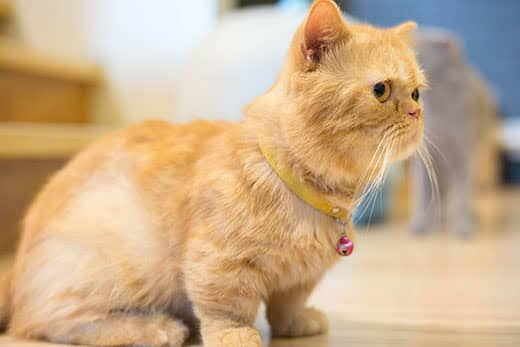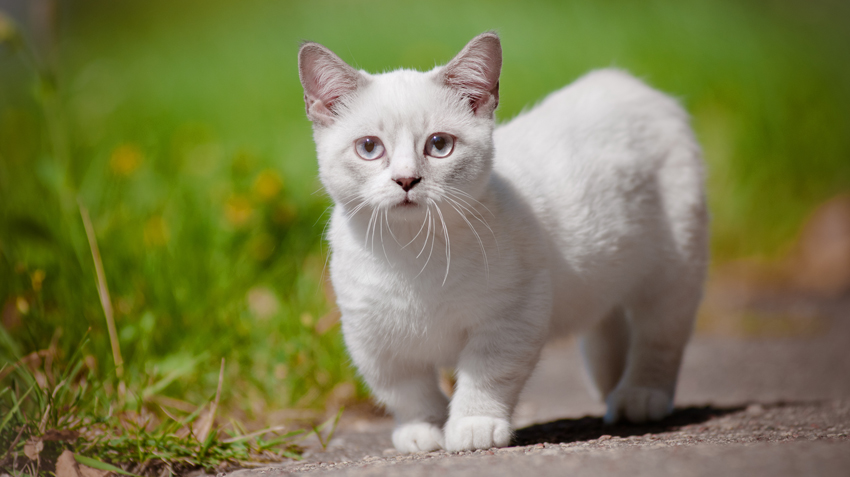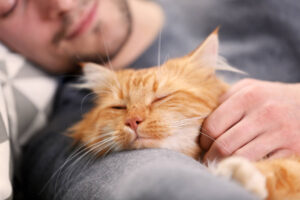Dating back to the early 20th century, munchkin cats have popped up around the globe and are recognized by The International Cat Association (TICA) and the South African Cat Council (SACC). However, munchkin cat breeds aren’t recognized by some other cat clubs, including the Cat Fanciers’ Association (CFA) USA or Europe, the American Cat Fanciers Association (ACFA), the Fédération Internationale Féline (FIFe) or the Governing Council of the Cat Fancy (GCCF).
Let’s take a look at some of the defining features and personality traits for munchkin cats.
What Is a Munchkin Cat?
Although their name suggests otherwise, munchkin cats are not perpetually kitten-like. They retain their trademark short legs, but as they grow into adulthood, munchkins do develop adult-sized bodies, including a long spine and tail. And if the dachshund comparison sounds familiar, the breed name may also ring a bell: It’s named after the munchkin characters in L. Frank Baum’s book, “The Wonderful Wizard of Oz,” by Solveig Pflueger, a member of TICA.
This genetic mutation isn’t new, but munchkin cats were rare; they weren’t recognized as a breed until the early 1990s. Today’s munchkin cats descend from cats with diminutive legs discovered by Sandra Hockenedel in Louisiana in the 1980s.
Features
The distinct feature of a munchkin cat is their short legs, which are due to a spontaneous genetic mutation, meaning that it naturally occurred. “Their short legs are caused by an autosomal dominant gene, which causes the long bones in a cat’s legs to develop at a shorter length,” explains TICA. This inherited genetic trait of dwarfism, presenting as short legs, is passed on to the offspring of munchkin cats. The risks associated with the genetic mutation prohibit munchkin cats from procreating with one another, and so they reproduce with domestic non-breed specific cats, specifies TICA in their munchkin breed standards.

What is a munchkin cat paired with? Often, they’re bred with the domestic shorthair or longhair, resulting in “lustrous,” “plush” and “silky” coats and “medium” features. Generally, they’re average in weight — around 10 pounds or 4-4.5 kilograms, says My Family Vets — and length, about 18 inches (45.72 cm) long. Their markings present in any pattern or color, and their eyes may also be any color.
Personality
Don’t be fooled by their average stats or short legs: Munchkin cats move swiftly! Their pattern of movement is often compared to that of a ferret because of their propensity to maneuver side to side. Munchkin cats can also jump onto furniture, albeit not as high as their taller counterparts; if you bring a munchkin into your home, you still have to kitty-proof your home!
Quick and lively, the munchkin cat always is up for playing and cuddling. They’re also very intelligent and require mental stimulation, which they can get from enrichment activities such as food puzzles, mechanical toys and even electronics with apps geared specifically for cats!
Munchkin cats do have one quirky trait that sets them apart from most other cat breeds: They’re hoarders, as the Cummings School of Veterinary Medicine at Tufts University says in TuftsNow, with a particular penchant for “jewelry and small shiny objects.” Tufts suggests that hoarding in animals provides “short-lived relief from stress,” so provide your munchkin cat with plenty of baubles from which to choose for their stash, or else you may find your own trinkets gone missing.
Caring for Munchkin Cat Breeds
A munchkin cat needs the same basic care as all other cats: access to fresh water at all times, nutritious cat food, routine grooming, regular veterinarian checkups and engagement with their humans.

Because of their genetic mutation, munchkin cats may be predisposed to medical issues, says Dr. Sarah Wooten: “Dwarfed cats often have joint problems and abnormally curved spines that can predispose them to herniated spinal discs.” Common joint and spinal issues may include arthritis, osteoarthritis and degenerative joint disease (DJD), says the Cornell Feline Health Center. Speak with your vet to develop a health plan for your little munchkin.
With an average life span of 12 to 15 years and a spirited personality, munchkin cat breeds liven up their pet parents’ homes!


